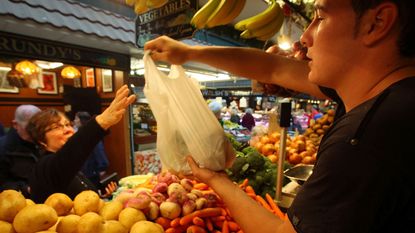‘Metric martyr’: the government’s plan to revive imperial measurements
The return of pounds and ounces is part of a ‘nostalgia war’, says historian Mary Beard

Boris Johnson plans to make a celebratory announcement this week that pounds and ounces will be returning to the UK, according to reports.
Grams, kilograms, millilitres and litres are “fast becoming a memory for younger Britons”, said The Guardian, as government insiders have reportedly told The Mirror that there will be an announcement on “imperial measures” on Friday, to coincide with the Jubilee celebrations.
The change in measuring legislation was pledged by the prime minister during the 2019 general election, when he heralded “an era of generosity and tolerance towards traditional measurements”.
Subscribe to The Week
Escape your echo chamber. Get the facts behind the news, plus analysis from multiple perspectives.

Sign up for The Week's Free Newsletters
From our morning news briefing to a weekly Good News Newsletter, get the best of The Week delivered directly to your inbox.
From our morning news briefing to a weekly Good News Newsletter, get the best of The Week delivered directly to your inbox.
Long-term contention
Traders have been legally required to use metric measurements, such as grams, kilograms, millilitres and litres, when selling produce by weight since an EU directive came into effect in 2000. As a consequence, these regulations have “long been a flashpoint for anti-EU campaigners”, said the i news site.
Pushback from the so-called “metric martyrs” reached a head in 2001, when a greengrocer from Sunderland was convicted for breaking EU rules banning the sale of fruit and vegetables in pounds and ounces. “He arguably did more than any politician to set Britain on the path towards Brexit”, said The Times.
In Brexit opportunities, a policy paper released in September last year, the Cabinet Office said that it planned to “review the EU ban on markings and sales in imperial units and legislate in due course”.
David Frost, the former minister of state at the Cabinet Office, said: “Overbearing regulations were often conceived and agreed in Brussels with little consideration of the UK national interest. We now have the opportunity to do things differently.”
‘Attempt to win over Brexit voters’
The timing of Johnson’s plan to return to imperial measurements has led to accusations of “an apparent attempt to garner support among Brexit voters in battleground seats” that the Conservative Party fears it could lose in future elections, said The Guardian.
But even though the move “represents a victory for ‘metric martyrs’”, The Mirror noted that “it is a largely symbolic one” aiming to address “gripes about EU interference in traditional English life”.
The newspaper added that “many adults under 40 will struggle with imperial measurements like a yard or an ounce”.
The reaction
Technology minister Chris Philp was supportive of the move, telling Sky News that the plan would allow “a bit of our national culture and heritage back onto the shop shelf”.
But Baroness Jenny Jones told ITV’s Good Morning Britain that Johnson was taking the opportunity to “throw a dead cat on the table and make us talk about this very trivial issue instead of all the other stuff that’s going on”. She described the plans as a “ludicrous suggestion”, given that shopkeepers will still be able to use metric measurements should they wish, as long as imperial units are also displayed.
And in an interview with the BBC’s Today programme, historian Mary Beard described the imperial vs. metric debate as a “bit of a nostalgia war”. She later tweeted: “I hope that everyone wanting the return to imperial weights and measures can multiply 1lb 12oz by 3!”
Imperial vs. metric
Most of the world uses the metric system – only the US, Myanmar and Liberia regularly use the imperial system.
- Under the imperial system, used in the UK until metric measurements began to be introduced in 1965, length is measured in inches, feet and miles. One inch is the equivalent of 2.54 centimetres, one foot is 30.48 centimetres and a mile represents 1.609 kilometres.
- Volume is measured in fluid ounces, pints and gallons. One fluid ounce is equal to 28.4 millilitres, a pint is 0.568 litres and a gallon is 4.546 litres.
- Weight, like length, is still commonly measured in the UK using the imperial system. One ounce (1oz) is 28.349 grams, one pound (1lb) is 0.453 kilograms and one stone is 6.35 kilograms.
Create an account with the same email registered to your subscription to unlock access.
Sign up for Today's Best Articles in your inbox
A free daily email with the biggest news stories of the day – and the best features from TheWeek.com
-
 Who actually needs life insurance?
Who actually needs life insurance?The Explainer If you have kids or are worried about passing on debt, the added security may be worth it
By Becca Stanek, The Week US Published
-
 Sexual wellness trends to know, from products and therapies to retreats and hotels
Sexual wellness trends to know, from products and therapies to retreats and hotelsThe Week Recommends Talking about pleasure and sexual health is becoming less taboo
By Theara Coleman, The Week US Published
-
 Is the AI bubble deflating?
Is the AI bubble deflating?Today's Big Question Growing skepticism and high costs prompt reconsideration
By Joel Mathis, The Week US Published
-
 Is David Cameron overshadowing Rishi Sunak?
Is David Cameron overshadowing Rishi Sunak?Talking Point Current PM faces 'thorny dilemma' as predecessor enjoys return to world stage
By The Week UK Published
-
 Will Aukus pact survive a second Trump presidency?
Will Aukus pact survive a second Trump presidency?Today's Big Question US, UK and Australia seek to expand 'game-changer' defence partnership ahead of Republican's possible return to White House
By Sorcha Bradley, The Week UK Published
-
 Can Boris Johnson save Rishi Sunak?
Can Boris Johnson save Rishi Sunak?Today's Big Question Former PM could 'make the difference' between losing the next election and annihilation
By The Week UK Published
-
 It's the economy, Sunak: has 'Rishession' halted Tory fightback?
It's the economy, Sunak: has 'Rishession' halted Tory fightback?Today's Big Question PM's pledge to deliver economic growth is 'in tatters' as stagnation and falling living standards threaten Tory election wipeout
By Harriet Marsden, The Week UK Published
-
 Stormont power-sharing in sight: 'good news' for Northern Ireland?
Stormont power-sharing in sight: 'good news' for Northern Ireland?Talking Point Unionists vote to end two-year boycott after agreeing legislative package to address post-Brexit trading arrangements
By The Week UK Published
-
 Why your local council may be going bust
Why your local council may be going bustThe Explainer Across England, local councils are suffering from grave financial problems
By The Week UK Published
-
 Rishi Sunak and the right-wing press: heading for divorce?
Rishi Sunak and the right-wing press: heading for divorce?Talking Point The Telegraph launches 'assault' on PM just as many Tory MPs are contemplating losing their seats
By Keumars Afifi-Sabet, The Week UK Published
-
 How would a second Trump presidency affect Britain?
How would a second Trump presidency affect Britain?Today's Big Question Re-election of Republican frontrunner could threaten UK security, warns former head of secret service
By Harriet Marsden, The Week UK Published